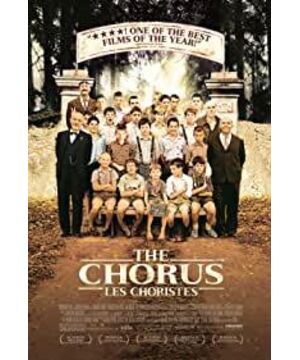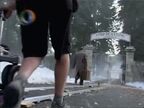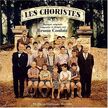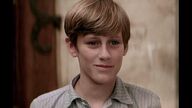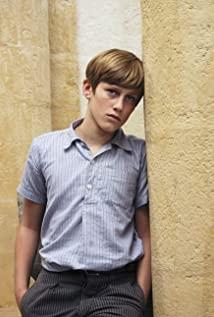After the shortest winter vacation in history, my son and I ushered in the beginning of school at the same time. Closing my eyes, I can see that the new school year is about to start, just like the previous semester, the son is carrying his heavy bag and starts to spin like a top: noon will be filled with countless timed homework, and at night, The homework centered on the exam paper began to appear. After hours of homework, my son would lay out stacks of test papers and homework books in front of me.
I will follow the requirements of the home-school contact book to write the prescribed content one by one, and attach my scribbled name.
As requested, I had to fill in exactly when my child was going home and when the homework was done. At a parent meeting, I was also told that in order to prevent children from plagiarizing each other, parents must have strict skills in their signatures: after the children's homework is handed to you, you must sign next to the end of the homework. Fulfilled the responsibility of a parent.
When I first heard such a request, I thought I had heard it wrong. I think the teachers are probably experienced in many battles, and they already know the tricks of children well, and their experience is unparalleled. I was overwhelmed with astonishment.
At the parent meeting, I was told: You can't just sign your name. Rather, write specifics. For example, in the English workbook, it is necessary to write: recited, dictated, or listened to and read for 15 minutes.
The teacher especially emphasized: After completing one item, sign one item. That's how hard it is.
I think the teacher's good intentions are as follows: if you don't do this, let your father sign it, and you will just be caught.
The seriousness and perseverance of the teachers gave me no gratitude at all, but a very uncomfortable feeling: I felt like a child who had never read or been disciplined. In broad daylight, being dragged to and fro.
I said to my son: After you finish your homework every day, I will sign it for you together. You don't have to do it once to check it out. Dad believes in you!
My thinking is simple: I have to unconditionally trust the child in certain things. At least I know him better than the teacher, and I believe I am more sophisticated, scheming, and cunning than him. So, unless it's my problem and I can't gain his trust, then he may hide or lie to me.
Sometimes teachers and parents are always caught in a seemingly dilemma: we don't want to, but reality forces us to. For the good of our children, we have to be so careful.
Sometimes, I wonder: Do teachers have at least respect for students and parents for their actions? Is the supervision of children really caring? What kind of attitude and value are being conveyed in the various initiatives?
I can understand the good intentions behind this approach, but I cannot agree with such behavior. Because behind this behavior is indifference and suspicion.
Whether it is an adult or a child, everyone needs kind understanding and communication. In human growth, there are many things that are more important than knowledge and skill education, such as respect and tolerance, as well as love.
(2)
Whenever I quickly sign my son's workbook, I think of "Spring in the Cattle Class". This is a French film that was said to have been a hit when it was released that year. 8.6 million French flocked to the cinema to see this simple film.
The film tells a story of understanding, communication, respect and forgiveness, a classic educational poem.
Failed musician Claremont Matthews arrives at "Bottom of the Pond" as a teacher, confronting him with a dangerously mischievous group of troubled kids. In school, there is a famous mantra: Make mistakes, punish! From the principal to the superintendent, everyone believes in this sentence!
The children do something bad, and once found, they are caught by the principal like a chicken, locked up, corporally punished, and then engaged in labor. Of course, such punishment did not reduce the number of mischievous children. Every little villain, after finishing his punishment, returns like a hero.
Mr. Matthew's approach is a little different: he'll find the kid who's deliberately making trouble, he'll find a way to hide from the rude principal, but he'll let the kid take the blame.
He always tried to communicate with children in an understanding way, and finally, he discovered music. He established a choir. The nature of children gave him a lot of long-lost joy and inspiration. He started writing songs for children and teaching them to sing.
The children suddenly became quiet. Those demonic natures seem to disappear day by day. In the choir, each child can find his place, and instead of fighting for strength, they become serene and radiate the brilliance of angels from their hearts.
The children sang in the song:
Feel the passion of the midnight,
the wave of hope, the passion of
life,
feel the glory of the journey,
the happy time of the children is
too fast to forget and fade away, and the
light shines
at the end of the road.
Finally, Mr. Matthew was expelled by the principal. The principal did not allow him to say goodbye to the children. Matthew was carrying his suitcase, still thinking: Why didn't the children come to see him. He thought: Is human indifference as hard as an iceberg that even warm music cannot melt?
As he was walking, he suddenly found countless paper planes underground. He looked up and saw countless planes flying out of the windows of the school's teaching building. And those little hands that kept shaking, saying goodbye to him. On those small planes, words of blessings and misses were written.
The kite flying in the wind, please don't stop
to fly to the sea, to the sky,
a child is watching your
reckless journey, the intoxicating whirl of
pure love, follow your track
to fly the kite flying in the wind, please Don't stop and
fly to the sea, float to the sky
A child is watching you
In the storm, your wings are high,
don't forget to fly back to me
(3)
Many times, I feel that our eyes should not always be fixed on some dark place.
When we put a spotlight and a magnifying glass on a child, what can we see? What do we hope to see?
We're teaching a job skill, a life-and-death competitive mentality. We are sacrificing the happiness and joy of childhood in order to have a successful life in the end.
If the spotlight is on us, all I can see is the fact that we're shifting the blame.
We couldn't do it when we were kids, and we kept making mistakes as we grew up, and maybe, it wasn't even successful. We think that everything now is logically connected to the past. We began to pass on our former dreams and hopes to our children.
We also believe in this approach: make mistakes, punish. Make another mistake, and punish again! There are countless mistakes, you can consider sitting together, encouraging students to tell each other, and finally dragging the parents in.
It was as if a voice was saying: Look, we are always racking our brains and taking responsibility for our children. If he's still like that, we've done our best. If he is still like this, this person can't be saved.
Indeed, we care about responsibility, and we care about what we are doing for our children. However, he doesn't seem to care about what he needs.
Really in education, there is no other way? !
I often think of the beautiful song "Spring in the Cattle Class", in which it sings:
Looking ahead to the future of your life
, the children who are forgotten and lost,
please extend your help
to them and lead them to a better future.
I have been I think all teachers and parents should take a good look at this movie: indeed, we cannot deny the reality that education is very perverted now. However, in such an environment, the relationship between teachers, students and parents has turned into mutual torture. And children are the biggest victims.
Perhaps, we don't have to use music to give up those stubborn habits: can we educate students without corporal punishment, can we give students more respect and understanding, or even some forgiveness.
Can we, like Mr. Matthew, give the child a suitable position and see the value of his existence: in the extraordinary spring, we sow, weed, and fertilize. Then, from March to October, through those sunny and stormy days, patiently greeted the harvest, and in our tears of joy, the children grew up healthy.
Sneeze: Original www.dapenti.com
View more about The Chorus reviews


